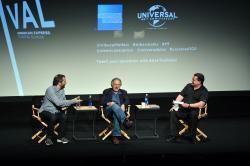Universal Pictures turns 100 years old this year. And as an event last night at the Tribeca Film Festival made clear, the venerable studio has completely lost sight of what it once was.
In 1912, a rebel filmmaker named Carl Laemmle founded Universal Pictures as part of his campaign against the then-dominant film industry, which Laemmle called the “film octopus.” To make his films, Laemmle was willing to violate the law: He was personally sued 289 times for intellectual property violations. The mainstream film industry held all of the important patents on film equipment and sued anyone who dared make films without their permission. They litigated to try to weaken the threat from filmmakers like Laemmle who were bringing to America radical ideas like the “feature” film (longer than 20 minutes), credits for actors, and other innovations (such as the chase sequence). And so Universal was born as a renegade studio, an outlaw, with radically different ideas of what film could be.
Despite the threats, Universal survived—and prospered. Along with 20th Century Fox and Paramount, Universal was one of the most important “outlaw” film studios in the early history of film, a decisive force in making Hollywood the center of American movies—and in making the United States a center of world cinema.
It is a dignified and important history. But the Tribeca Film Festival, which began this week, decided to honor its anniversary in a rather odd fashion. The festival put Judd Apatow and Robert De Niro in front of an audience with a moderator and had the two men talk about themselves for about an hour. Laemmle was mentioned exactly zero times—and, indeed, Universal itself was mostly forgotten.
A sample: Apatow says to De Niro, “You’re a such a nice, likeable guy. Why do you always play murderers and so on?” Robert De Niro: no answer.
Two celebrities talking about themselves as though guests on a late-night television show. Presumably it is too awkward these days to talk about Universal’s early history, and particularly its belief in the occasional necessity of law-breaking in order to further the goals of art, especially when a new medium arrives. But that just happens to be a crucial part of the legacy of Universal Studios. To celebrate that legacy without discussing Laemmle felt a bit like attending an anniversary of the United States that skipped over the whole George Washington thing.
